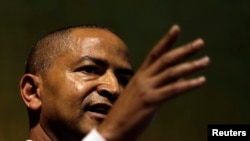A top Congolese opposition leader and other figures opposed to longtime President Joseph Kabila met in South Africa on Monday to build a coalition ahead of long-delayed elections in the turbulent, resource-rich country.
Ending a three-day forum, delegates at a resort hotel near Johannesburg said they would work together to elect Moise Katumbi, who fled Congo in 2016 amid legal troubles that he said were fabricated to stop him from challenging Kabila.
In a speech, Katumbi told cheering supporters that Congo must hold "credible and transparent elections" and appealed to his compatriots to "rebuild our country together," and the audience watched a slick video that outlined his accomplishments as the former governor of Congo's Katanga province and his leadership of one of Africa's major soccer teams, TP Mazembe.
Katumbi backers waved flags bearing his image and wore T-shirts with an image of clasped hands and the slogan "Ensemble," which means "Together" in French.
The goal of the gathering, opposition activist Germain Kabemba, was to "fight against those who want to maintain power" and to "accelerate the process of democracy."
While Katumbi is one of Congo's most prominent opposition leaders, there are concerns about whether he can effectively run a political campaign because of security concerns if he returns home. Katumbi was sentenced to three years in prison in absentia over allegations of real estate fraud; Kabila has insisted that Katumbi should face justice.
Also, Congo's plans for an electronic voting system have increased concerns about possible electoral fraud and malfunctions in the deeply divided country of more than 80 million people. Kabila, who has been in power since his father and predecessor was assassinated in 2001, is barred by Congo's constitution from running for a third term. Analysts believe he could seek to groom a successor so as to protect his interests after he leaves office.
The opposition has accused the government of delaying elections to keep Kabila in power, while the government had said vote preparations need more time.
Last week, the U.N. Security Council condemned violence during nationwide protests in Congo in February against Kabila's extended rule and urged all parties to ensure that a presidential election occurs Dec. 23. Kabila's mandate ended in December 2016 and he agreed to set an election by the end of 2017, but Congo's election commission said the vote couldn't be held until the end of this year.
The top U.N. envoy for Congo, Leila Zerrougui, has warned of the risk of more violence in the run-up to the election. She described the humanitarian situation in the country as shocking, saying 4.5 million people who were displaced from their homes need help, hundreds of thousands more have sought refuge in neighboring countries and more than 2 million children are severely malnourished.
Congo is a country of great natural wealth despite the poverty and hardship that afflicts many of its people. It is a major copper producer and the world's largest producer of cobalt, a mineral used in lithium-ion batteries.




